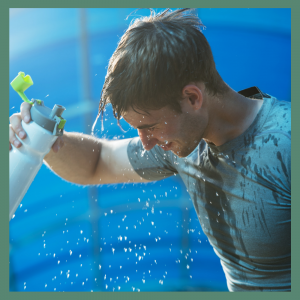Massage Research Helps Athletes Train Better and Prevent Injury
Posted:Wednesday, February 20, 2019
By Robert E. McAtee, LMT, BCTMB, CSCS
 For seven consecutive years, the Massage Therapy Foundation has been granted the honor of participating in the John Hancock Non-Profit Marathon Program, one of MTF’s biggest fundraisers of the year. The four runners on Team MTF– Running for Research are undergoing a nearly six-month-long process of training to run 26.2 miles in the 2019 Boston Marathon. The funds that these dedicated four raise will go directly towards research, education, and community service projects critical to advancing the massage therapy profession.
For seven consecutive years, the Massage Therapy Foundation has been granted the honor of participating in the John Hancock Non-Profit Marathon Program, one of MTF’s biggest fundraisers of the year. The four runners on Team MTF– Running for Research are undergoing a nearly six-month-long process of training to run 26.2 miles in the 2019 Boston Marathon. The funds that these dedicated four raise will go directly towards research, education, and community service projects critical to advancing the massage therapy profession.
Writing about a charity run for massage therapy research is a perfect opportunity to look at some of the recent research on how therapeutic massage can benefit marathon runners and other athletes. We can also explore how knowing about other types of research may help athletes train better and prevent injury.
Athletes have come to rely on massage therapy to enhance their training and recovery. This holds true for runners at every level, and especially for endurance runners like marathoners. A plethora of anecdotal evidence exists to support sports massage as an effective intervention to aid in recovery from intense training. Much of the peer-reviewed research about massage in athletics is inconclusive and most massage professionals advocate for quality research into the effects of massage for athletes using well-designed studies, with treatment performed by practitioners specifically trained to administer sports massage.
An example of such a s study: Ann Blair Kennedy, PhD, and colleagues at the University of South Carolina conducted a quasi-experimental, convergent, parallel, mixed-methods design study of one nine-member paracycling team over a two-year period in 2015-16. The team cyclists received consistent massage from trained and experienced sports massage therapists. Data were collected through the use of multiple surveys reviewing goals, stress levels, quality of sleep, pain levels, muscle tightness, performance on the bike, and quality of life off the bike. Additional information was gathered from treatment notes, exit surveys, and follow-up emails. The results of the study indicate that sports massage therapy assisted in the athletes’ overall recovery, especially in reducing muscle tightness and improving the quality of their sleep. No improvements were noted in the athletes’ health-related quality of life measures. These results support the benefits of sports massage for para-athletes as well as able-bodied athletes and bolster the anecdotal evidence about the value of sports massage that’s been provided by athletes for more than four decades.
In 2017, researchers from the School of Sport and Exercise Sciences at Liverpool John Moores University in Liverpool, UK, published a study in which they compared two groups of runners with different levels of training. Group 1 consistently ran 30 miles or more each week and Group 2 ran less than 10 miles per week. Their findings indicate that high-mileage running helps the muscles and tendons of the legs and hips adapt, contributing to running efficiency (less work to cover the same distance). These advantages become even more noticeable at faster running speeds. As the Team MTF runners continue to train for the race, they will notice this adaptation taking place.
The ability to adequately recover from the training volume and intensity required to complete a marathon is a critical factor for injury-free training. Successful marathon training requires smart training progressions, as well as programmed recovery that includes proper post-exercise cool-down.
 As the body generates heat during exercise, involuntary coping mechanisms such as sweating, and voluntary actions such as drinking and dousing the head with water at rest stops help athletes dissipate body heat. Voluntary actions are called “thermal behavior.” A small study recently reported interesting findings in thermal behavior that indicate gender may play a role in some aspects of recovery. The study authors found that women appear to need more cooling during and after exercise than men, possibly because it takes longer for women to reduce their core body temperatures to normal ranges after exercise. Although this study included only 20 participants (10 men and 10 women), the results have implications for recovery strategies in the overall training programs for our “Team MTF” marathoners.
As the body generates heat during exercise, involuntary coping mechanisms such as sweating, and voluntary actions such as drinking and dousing the head with water at rest stops help athletes dissipate body heat. Voluntary actions are called “thermal behavior.” A small study recently reported interesting findings in thermal behavior that indicate gender may play a role in some aspects of recovery. The study authors found that women appear to need more cooling during and after exercise than men, possibly because it takes longer for women to reduce their core body temperatures to normal ranges after exercise. Although this study included only 20 participants (10 men and 10 women), the results have implications for recovery strategies in the overall training programs for our “Team MTF” marathoners.
I encourage each of you reading this blog to contribute to support the Team MTF– Running for Research athletes as they raise money to support continuing research into the benefits of massage therapy. This research benefits therapists, athlete-clients, and scientific knowledge as a whole.
Author Bio:
Robert E. McAtee, LMT, BCTMB, CSCS has maintained a full-time massage therapy practice for over 38 years, specializing in sports massage and soft tissue therapy, with significant clinical experience treating people with injuries and chronic pain. Since 1988, Bob has owned Pro-Active Massage Therapy, an active, international private practice in Colorado Springs, CO. In addition to his private practice, Bob is an NCBTMB Approved Provider and a sought-after presenter throughout the U.S. and internationally on the topics of facilitated stretching, sports massage, and soft-tissue injury care.
Bob is Board Certified in Therapeutic Massage and Bodywork, is a Certified Strength and Conditioning Specialist through the National Strength and Conditioning Association, and has been an active member of the AMTA since 1988.
He is the co-author of the best-selling Human Kinetics book, Facilitated Stretching 4th Edition, used by health and fitness professionals worldwide as the go-to resource for PNF stretching and strengthening techniques. His latest book, Sports Massage for Injury Care, will be released in 2019.
References:
Verheul, J, Clansey AC, Lake, MJ. “Adjustments with Running Speed Reveal Neuromuscular Adaptations During Landing Associated with High Mileage Running Training.” Journal of Applied Physiology. March 2017, 122(3):653-665). https://www.ncbi.nlm.nih.gov/pubmed/27932678
Vargas, NT, Chapman, CL, Sackett, JR, Johnson, BD, Gathercole, R, Schlader, ZJ. “Thermal Behavior Differs Between Males and Females During Exercise and Recovery.” Medicine & Science in Sports & Exercise: January 2019, 51(1):141–152. Abstract: https://www.ncbi.nlm.nih.gov/pubmed/30095750
Kennedy AB, Patil N, Trilk JL. “Recover Quicker, Train Harder, and Increase Flexibility: Massage Therapy for Elite Paracyclists, a Mixed-Methods Study.” BMJ Open Sport & Exercise Medicine. 26 Jan 2018; 4(1). https://bmjopensem.bmj.com/content/4/1/e000319
